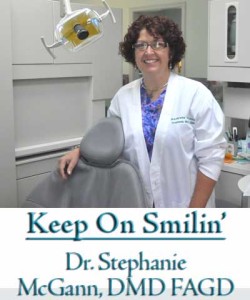Your oral health has a bigger impact on your overall health than you might think
By Dr. Stephanie McGann, DMD, FAGD, Columnist, UnionvilleTimes.com
 If the eyes are windows to the soul, then our mouths are talking about us behind our backs. What I mean by that is so many medical conditions are related to our oral health. I’m going to take today’s column to show how important good oral health is to our entire body.
If the eyes are windows to the soul, then our mouths are talking about us behind our backs. What I mean by that is so many medical conditions are related to our oral health. I’m going to take today’s column to show how important good oral health is to our entire body.
This mouth/body connection has gotten a lot of press lately as more and more studies are showing a significant connection between our medical and dental conditions. So I am going to help make sense of some of these situations. In medicine, knowledge is power and I firmly believe that the better a person, understands their situations, the more equipped they are to make good healthcare decisions.
Of course, we start with a peek at gum diseases. Most gum diseases including gingivitis (bleeding gums) are related to accumulations of harmful bacteria in the mouth. There are many types of bacteria, some are more destructive than others. This chronic infection usually has no pain. Gum disease can lead to tooth loss, bad breath, bleeding gums and “other health problems.”
Today we learn more.
In an individual with COPD (chronic obstructive pulmonary disease), Asthma, pneumonia or other lung disease may have a diminished prognosis because of dental infections. Bacteria from the mouth tend to work their way into the lungs. Why? Most people with compromised lung function breathe through their mouth more often. They have a lesser ability to cough and adequately clear mucus from their lungs. Now imagine the destructive bacteria from gum disease moving into the lungs. Not only is their body fighting gum disease (which nobody really worried about because it was the “least of their problems”) now that untreated gum disease is making their life threatening lung problems worse.
Oral bacteria can clog the arteries – yes that’s right, clumps of bacteria from the mouth can lodge on plaque (build ups) found in the arteries causing a blockage. If that blockage is in the coronary arteries we have a heart attack, if the blockage is in the brain we have a stroke. Some people are required to take antibiotics prior to certain dental procedures specifically to prevent these clumps of bacterial growth. When, we keep our oral bacteria in check and we have improved our health in so many ways.
Diabetics develop gum disease (periodontitis) more easily because diabetes slows the body’s natural healing process. In addition, blood-sugar levels may be adversely affected by advanced gum disease, causing complications for diabetics. Research shows that type2 diabetics who are poorly controlled are significantly more at risk for gum disease. So gum disease in a diabetic is a double edged sword. The diabetes makes the gum disease worse, and the gum disease makes the diabetes worse. Diabetics need to be motivated to maintain their oral health as it is important to their overall situation.
A word for the ladies.
It’s bad enough to develop osteoporosis. What they don’t tell you is that you are now at a greater risk for tooth loss if you develop gum disease.
Now a story – Once upon a time a lovely young lady went to the dentist. She was expecting a child. When the dentist suggested she needed to have her gum disease treated but he wanted to speak with her OB/GYN first, her reply was “suit yourself but I’m going to lose this baby anyway.” Apparently this young lady had tried numerous times to have a child but always ended in a miscarriage. The dentist spoke with the young lady’s physician and he related the same thing. So with the blessing of the OB the dentist treated the periodontal disease. Weeks turned into months. One day the young lady returned to the dental office – with a stroller. She believes that this dentist saved her baby.
While treating gum disease cannot prevent a miscarriage and in some cases may not be recommended during pregnancy, the studies do show that pregnant patients with periodontal disease are significantly more likely to have underweight or pre-term babies.
These are just a few of the hundreds of interactions between the mouth and the rest of the body. It is my goal as a dentist to bring my patients into good oral health and help keep them that way. Gum disease often has no pain and no symptoms. Regular dental visits are vitally important to maintain good oral health and catch small things before they become a larger concern. If you know someone who is suffering from medical conditions, make sure they take care of their mouth. It’s important.
Learn more at
http://brandywinesmilecenter.com/?page_id=631
Dr. Stephanie McGann is a resident of the Unionville area and along with her partner, Dr. Marie Scott, operates The Brandywine Smile Center, a family-friendly dental practice in Concordville. She is a Fellow of the Academy of General Dentistry.






